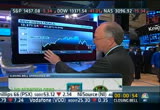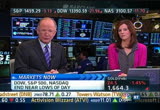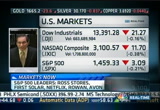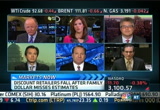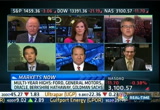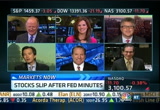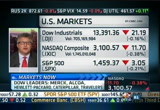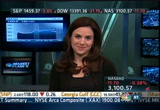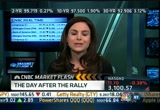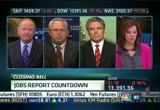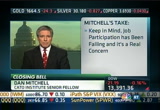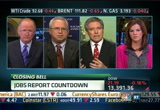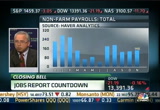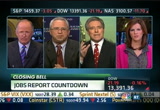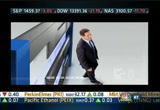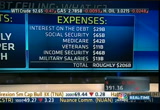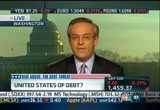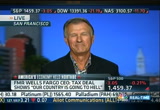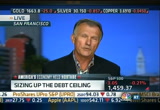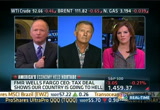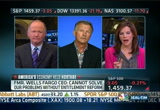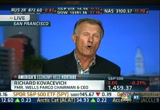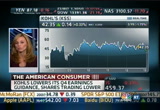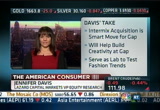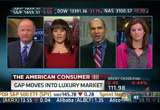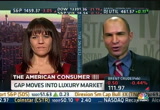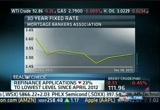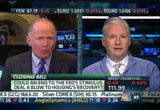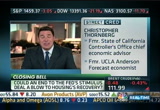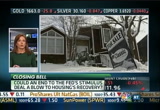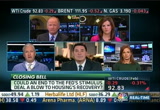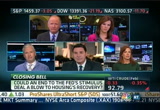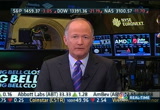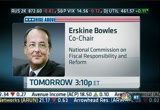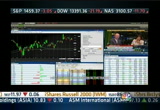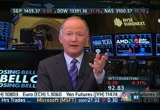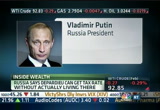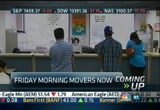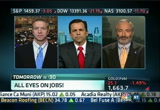tv Closing Bell With Maria Bartiromo CNBC January 3, 2013 4:00pm-5:00pm EST
4:00 pm
a minute to go. quickly on the dow, a little profit-taking on the open this morning. crawled out of that whole until the fed minutes came out, and we've been going lower since that time, about 41 points. tomorrow it's the jobs report, matt cheslock, that will set the tone for the day. what are your expectations? >> hate to give washington credit for anything. not going to give them credit for yesterday's rally, still bearish and using this time to sell and just not a believer. there's way too much out there that's going to go negative. >> you don't think the jobs numbers will be all that strong. >> i don't think so. not going to be a believer of any data that came out. too many going on in december, too many holiday storms and too many storms, too many factors in it. i'm selling into any new rally i get. >> a strong sentiment on the floor here at the new york stock exchange, by the way, and we're going out off the lows. a little buying coming in with the dow down about 25 points. that's the first hour of the "closing bell." let's start hour two right now.
4:01 pm
>> and welcome to the "closing bell." i'm kelly evans in today for maria bartiromo. bill griffith will join me in just a moment. stocks are closing lower on concerns some members of the fed favor slowing or stopping economic stimulus earlier than maybe was previous thought. here's how we're finishing the day on wall street. the dow jones industrial average pointed down by about 22 points or 0.2%, about double that is the loss on the nasdaq today, down 0.4 and it's giving up some of its gains from yesterday, 0.2 on the s&p bit. after we saw stocks moving towards their low after the fed minutes did get a little bit of a rebound into the final minutes of trading. >> the lead bias was to the upside. let get straight to the markets. while we didn't give back all of yesterday's gains, we did close off the day's lows. should investors really be concerned about the potential end of the fed's easing program? ben pace from deutsche bank, private wealth management is with us and greg ipp, with "the
4:02 pm
economist" and we'll get his take and david kudlow from mainstay capital management and our own rick santelli. rick, i'll start with you because of the market response to all of this. the dollar went higher and yields went higher, gold lower. all the things that you would imagine would be an unwinding if the fed were to begin, removing some of the liquidity, right? >> well, it's not even removing liquidity. what we're discussing isn't that they are going to sell their inventory. it's that they would stop or refrain from purchasing any more sooner than expected. >> right, and as much as i don't like these programs, and i would be very happy if they did, i still think that we are jumping to some very aggressive conclusions about some dissenters that probably have been around, and the minutes give them a better venue to air their dissension, but in the end, you know, we only see lack or truly dissent when it comes to these votes. i think it's something to reckon with and a lesson to be learned. we jumped to eight-month high
4:03 pm
yields, not because the fed is making an exit but because the market is nervous about what the fed is doing which makes my one final comment that when this all reverses, it isn't going to be the fed's planned exit, it's going to be market-driven, whenever that is. >> david, is this reaction to the fed minutes, or is all that concern overblown? is there more going on here? >> well, i -- i agree with rick. if you keep in mind that the -- the meeting we're talking about, the same meeting where asset purchases were raised from $40 billion per month to $85 billion per month and i think the reaction might be a little bit overblown, yes, there's some dissenters, but in the end we know what the message was coming out of that meeting. >> and, ben, what about you? do you look at this and worry about the fed's exit strategy? do you look at a day like today after a 3%, 4%, back-to-back move on some of the major indexes and a look at the fact that we're not worse. >> we had such a big run that we
4:04 pm
pulled back by five points in the s&p, not looking for reasons, more than anything. the fed is going to be in ease mode. i gel this qe that they did in september based on how they are laying it out there. they have put themselves down with targets and we're expecting them to be easy for at least the next 18 months at a minimum. we've become addicted to ease, no doubt about it. >> right. >> if there is any signal of true tightening and then i think the markets will pull back much more dramatically. >> greg, you are one of the most connected reporters in washington to the fed. how do you read those minutes today, and the implications they might have for future monetary policy? >> you know, i real very to reiterate what sick said a minute ago. can you not reach too much into what several quote, unquote members say. those are the dissenters. keep your eye on what the leadership, ben bernanke, janet yellin and bill dudley think. i don't think any of those guys are ready to take their foot off
4:05 pm
the accelerator yet. the key thing to remember is if a year from now the fed is realistically thinking of stopping the quantitative easing, it will be because the economy is doing what they want it to do. the economy will be growing 2.5%, to 3%, unemployment down to 6.5%, a really good scenario for the stock market, and they will not be worrying about the fed pulling back because the economy will be doing what they want it to do. >> greg, if there's any concern that markets should have, as you reiterate today, it's maybe more on the fiscal policy side of things and what's coming out of washington, not from ben bernanke but cap hill, and i was surprised to read your take comparing policy today is the equivalent of beirut in 1982. >> kelly, i don't mean that in a bad way. except for the bombs going off it's felt a bit like civil war on the fiscal front in washington for the last two months, two years actually, and the market has basically gotten used to this constant level of political dysfunction and they are used to policy-makers taking
4:06 pm
us to the deadline and not quite going over it, and that's why i think for the next two months they won't be paying a lot of attention to what ethan harris calls not the cliff but the three gorges of the sequester, the debt ceiling and the continued resolution expiring what. will really shock them is if they do take us over the line. >> got to make money in this market. where will you invest as we approach yet another deadline coming up in another couple of months here? >> we're still generally constructive on stocks and a little cautious based on the kind of run they had over the last few days, but we think even in the fixed income markets, not straight into media duration debt, but high yield, we still think you'll get spread contraction and good carry and emerging market debt as well with pretty good yields and yield curves coming down as the monetary authorities also ease. >> david, what do you like here? >> well, you know, we think that
4:07 pm
we're looking at the early cyclicals. i was on the show about a year ago recommending gm and ford. he with a good year in 2012. ford up 20% and gm up 42%. they have set new 52-week highs today, but we think there's further upside in these stocks, and i don't know if we know the 42% out of gm this year, but 20%, gains for both those stocks, housing and areas in high yield for diversification and defense with the volatility ahead with the further negotiations in washington. >> all right. so you're going hang in with those there. gentlemen, thank you all. appreciate it. talk to you seen. >> thrown for a loop. stocks slipping from the session highs after the fed's last-minute report came back. check back in with jackie d'angelis on whether yesterday's leaders on yesterday's rally have turned into second day laggards. >> that's a good question. >> yesterday's rally was driven, of course, by a deal on the cliff. a bit of euphoria driving the markets higher, but today it seems we could be getting back
4:08 pm
to fundamentals. now yesterday the top three large-cap sectors on the s&p were telecom, technology and financials. today all of those sectors closing lower while consumer discretionary, health care and utilities were the only sectors to close higher, but even those gains were very slight. now, looking at the dow today, unh and microsoft leading the way lower. interesting, because yesterday health care stocks saw a bigger bounce when spending cuts that would impact the sector doesn't take effect and microsoft was one of the highly weighted stocks that led both the dow and the nasdaq higher, but it reversed course today. meantime, the financials were mixed to mostly lower today as well, despite a slew of upgrades out there, while the fiscal cliff deal was initially positive for these stocks, there's still a lot of uncertainty out there, especially in light of coming debt ceiling and spending debates. bill and kelly as the saying goes, when a difference a day makes. >> yes, indeed. thank you. see you later, jackie. much more ahead. you've heard strong words about the tax deal from aetna's ceo in
4:09 pm
the last hour. nothing compared to what the former chairman and show says about the debt deal. he's fuge. >> and gap, are they getting too rich for the customers? what retailers have to say about this stock's high-flying chances for more gains coming up. [ male announcer ] at scottrade, we believe the more you know, the better you trade. so we have ongoing webinars and interactive learning, plus, in-branch seminars at over 500 locations,
4:10 pm
4:12 pm
all eyes will be on tomorrow's jobs report. it's the first of 2013 and a strong adp report, bill this, morning has been boosting expectations. >> right now the consensus from the number jumped from a gain of 150,000 to a gain of 160,000 with an unemployment rate of around 7.7%. >> scott brown of raymond james says the fiscal cliff concerns about hiring may have been overdone, while done mitchell of the kato institute says if the u.s. stays on its current path our economy may start to look a lot like europe. both join us now. gentlemen, good afternoon. i guess we'll start just by asking, first of all, scott, what tomorrow's payroll report may look like. >> well, i think, you know, if you look at the numbers we had today, for example, the challenger layoffs, you're still
4:13 pm
looking at a very low level of job destructions. you see that in the jobless claims as well, but over the last couple of years, job destruction really hasn't been much of a problem for the u.s. economy. really been a lack of new hiring. the adp number came in this morning pretty strong. >> right. >> not really seen as a good predictor of the official bls numbers but does suggest that, you know, there really wasn't any restraint on hiring because of fiscal cliff fears. >> yeah. dan, i heard the analogy made that we're hearding towards a european model. what do you mean specifically, and what implication does that have for hiring in our country right now? >> companies hire workers because they think those workers will make them money, and for the entire 21st century, not just under obama but also under bush, we've had a bigger burden of government, more regulation, more government spending, crowding out private sector activity, and i think that's one of the reasons we've had such a historically anemic recovery, and i think given the
4:14 pm
demographics and entitlements that we're looking at more spending and higher taxes down the road, and those things just don't add up to a vibrant economy. >> dan, if there's any way in which we're heading the way of europe it's in our policy making. i think, you know, reminds me of still being over in london where you're looking at meetings and the brokered deals between different officials, and inability to kind of tackle the longer term issues. this is the exact point "the economist" makes this week if there's some worry here it's really what we're seeing in terms of policy making out of washington. >> two pieces of that. there's the uncertainty, and we saw that with waiting until after the last minute to get a fiscal cliff deal, but then there's the actual policy because you can have certainty. greece in, some sense for years had certainty, but it was the certainty of a very highly regulated, very corrupt, very government-driven economy, and as we move in that direction with both republicans and democrats contributing to the problem, then i worry we're going to get the kind of
4:15 pm
stagnation that is so endemic in much of europe. >> scott, do you agree. go ahead. >> not at all. i disagree with that view. if you look at the recess and the relatively soft recovery, this isn't a supply side story. this is a demand side story, and for the longest time this has been a chicken and egg kind of question. you need the better job growth to create the stronger demand. you need the better spending to create the jobs and so on, and for the last couple of years we've had a number of headwinds in the economy. had a very weak housing sector. we've had weakness abroad. we've had contraction going on in state and local government, and a lot of these headwinds are really starting to fade now, and you're starting to see the development of positive feedback loops in the economy. we'll have some issues now in the short term because of this increase in payroll taxes. that will hit consumer spending in the short term, the mini fiscal cliff with the raising of the debt ceiling and the decisions about spending coming up in just a couple of months. >> right. >> but if you look through and beyond the issues i think the
4:16 pm
fundamentals are really looking a lot better for the u.s. economy. >> i guess the question is if they are not going to be hiring because they don't think they can make enough money because of all the regulations and the government intervention, what do you do with all the cash that's sitting on their balance sheets right now you? know, they got to do something with it eventually, don't they? >> they have been sitting on it for a couple of years now. companies with more than $1 trillion of cash on hand that they don't feel there's anything productive that can be done, and i guess i disagree with the other guest about the analysis of demand versus supply side driven recession. the keynesian argument which is what demand side is all about, well, it didn't work for hoover and roosevelt in the '30s. it didn't work for japan in the '90s. it didn't work for bush in 2008 and it didn't work for obama in 2009. i mean, yes, our economy is probably going to continue to get better very modestly over the next year or two, but the reason we have a weak recovery is because of too much government, not because of too little. >> i don't know too that there's any way that you can state that
4:17 pm
without looking at the fact that it's precisely because the u.s. has been more stimulative and less following the austerity approach that europe has that we'll see a decent jobs report tomorrow morning scott, last word? >> well, i think you have seen improvement in the job market over the last couple of years. it really could be a lot stronger, but i think we are well on the way to recovery, and this is not the typical recession. this is a major financial crisis that we went through, and these things typically take a very long time to recover. >> and let's remember government caused the financial crisis, too, so there is a feedback loop but it's bad government policy. >> all right. dan mitchell, got brown, good to see you both. thank you for your thoughts today. >> buckle up. default may not be the risk but the federal government shutting down if lawmakers fail to reach a deal on the debt ceiling sure is. we eel run through what that could mean for the country and financial markets next. >> also ahead, washington's tax deal is drawing fire from corporate america. wells fargo former ceo dick
4:18 pm
kovacevich said our country is in his terms going to hell. why do i always have to say that? he's here on the other side of the break. tdd#: 1-800-345-2550 gives me tools that help me find opportunities more easily. tdd#: 1-800-345-2550 i can even access it from the cloud and trade on any computer. tdd#: 1-800-345-2550 and with schwab mobile, tdd#: 1-800-345-2550 i can focus on trading anyplace, anytime. tdd#: 1-800-345-2550 until i choose to focus on something else. tdd#: 1-800-345-2550 all this with no trade minimums. tdd#: 1-800-345-2550 and only $8.95 a trade. tdd#: 1-800-345-2550 open an account with a $50,000 deposit, tdd#: 1-800-345-2550 and get 6 months commission-free trades. tdd#: 1-800-345-2550 call 1-866-294-5411.
4:19 pm
mine was earned off vietnam in 1968. over the south pacific in 1943. i got mine in iraq, 2003. usaa auto insurance is often handed down from generation to generation. because it offers a superior level of protection, and because usaa's commitment to serve the military, veterans and their families is without equal. begin your legacy, get an auto insurance quote. usaa. we know what it means to serve. i am probably going to the gas station about once a month. last time i was at a gas station was about...i would say... two months ago. i very rarely put gas in my chevy volt. i go to the gas station such a small amount that i forget how to put gas in my car. [ male announcer ] and it's not just these owners giving the volt high praise. volt received the j.d. power and associates
4:20 pm
appeal award two years in a row. ♪ we replaced people with a machine.r, what? customers didn't like it. so why do banks do it? hello? hello?! if your bank doesn't let you talk to a real person 24/7, you need an ally. hello? ally bank. your money needs an ally. welcome back. well, the next battle royal in washington could have costly consequences. in case you somehow haven't heard, debt ceiling deadline is hanging over our heads. >> yeah, not exactly default that's the big risk. it's the federal government shutting down if congress fails to broker a deal two months from now. eamon javers is here to explain
4:21 pm
some more of that. eamon. >> hi, bill. let me walk you through what happens if we actually have a situation where the united states congress refuses to pass an extension to the debt ceiling. if that happens, the united states can't add any new debt, cannot continue to borrow, so what would you have to do if you're the united states government? you'd have to live off of your tax receipts. take a look here at some of the charts that we've prepared, and can you see exactly how much money the u.s. government brings in every month. it's about $206 billion in receipts every month. that's the whole amount of money the u.s. government would have to finance its operations so how does that break out? what are the expenses on a monthly basis? we'll start with the absolute must-dos. interest on the debt, $29 billion a month. got to pay that. social security, got to pay that. 65 billion, medicare about 42 billion. veterans will b $11 billion. income security programs. that's about $46 billion in expenses every month and also military salaries.
4:22 pm
this is our estimate so some of these numbers are a little bit rough, but that's about $13 billion a month, and what does that get you? it gets you a grand total of expenses of absolute must-do things that the government has to do every month of about exactly $206 billion which is how much the u.s. government takes in in taxes every month. so if you prioritize those things. you can continue to operate those pieces of the federal government, but what you can't do is anything else, including all of the things in the federal government that you've come to love and expect in our government including the fbi, homeland security, the faa, nuclear regulatory commission, defense contracts, and most importantly for cnbc the bls jobs number. every month we would not have that. i don't know what hampton pearson and steve liesman would do if we didn't have that every month but that's the situation we'd be facing in the u.s. government had to prioritize and not spend that money on the things that the federal government does every month, so very trick and very tough
4:23 pm
decisions, and it gets even worse if you look at the impact on the treasury market because there there's a possibility that you wouldn't be able to roll over treasuries ongoing debt and you'd have to start paying back the principal on some of the t-bills out there in the market. that could be very, very destabilizing as well, and that would be up to market forces, guys. >> if you want to see interest rates rise, that's one way to do it. eamon javers in washington. >> one of the worst case scenarios. >> our next guest is not at all happy with the tax deal that averted the fiscal cliff and he said talking to the politicians doesn't work. he says the timing has come to educate american public and teach them what. >> that our country is going to hell. yes, he made me say that. dick covass very much is a former ceo at wells fargo and joins us now. you're not happy. explain. >> well, the politicians have worked for the better part of this year and spent the entire month of december supposedly to
4:24 pm
try to fix some of our problems and reduce our deficit. i am stunned and shocked by basically nothing has been done. if you net out what happened with the increase in revenue and the offsets, we've increased and reduced our deficit by $40 billion a year with over a $1 trillion deficit, that's less than 4%, and i think what we need to do in terms of education is to look at our government more like a family. our government takes in about $2.2 trillion a year. it spends $3.8 trillion, and it has a $14.3 trillion deficit. let's just take all those zeros away and pretend that our government is a family. so this family earns 22,000 a year. it spends $38 now a year, and it has a credit card bill of or balance on its credit card of
4:25 pm
$143,000. if you take all the reduction in expenses over the past year that congress has passed and the most recent increase in taxes and the revenue, they have -- this family has reduced its deficit by under $100. they have done nothing. they have done nothing. >> it's up to about 160 now on that credit card debt, dick. >> that's what's going to happen. when we get to -- >> we are like a family. i mean, it's like we're all crammed together on thanksgiving and we can't get along. it's this awkward coming together of idealogs with very, very different ideas of how to proceed from here. some want to see us grow by using the government spigot with spending and more government intervention in our lives and the other side obviously, and i think you're in this camp, wants less government in our lives, and we want to be free to use
4:26 pm
our money as we see fit, but where is the middle ground on that when nobody wants to give any ground right now? >> well, i think the american public has to speak up. our politicians won't do it, failed to do it. >> isn't that what we did on election day? >> i don't think the public understands yet how serious this is and it's going to get even more serious the next couple of months. i think that the -- that the increase in the debt ceiling is far more serious than -- than going over the cliff, if you will. and what's happening is the republicans are going to use -- they think they rolled over on the revenue side, and now they are going to play hardball on the expense side, and the president said he's not even going to negotiate that. >> yeah. >> i mean, we are totally out of control, and this credit card debt that i mentioned is going to be left to our children and grandchildren, and i don't believe americans want to leave their debt to their children and
4:27 pm
grandchildren, and we have to get this across, and i think cnbc can play an important role of educating americans of what we're facing. >> well. >> we cannot solve our problems without entitlement reform, and we can't solve our problems without economic growth. >> let me ask you this. >> the policies we have in washington today is to say we're not going to change anything in entitlement and we are taking positions that are going to reduce our economic growth, not improve it. >> it would appear that the republicans are destined and they intend to use the debt ceiling as part of a showdown. that's the end game that they are looking for. >> that's what i understand. >> do you agree with that strategy? >> i don't agree with that strategy, but i think that's what they are going to do. >> dick, just to go back to the important point you just made about growth. how do you keep growth in place while accomplishing those all-important measures, long term that you talked about, when it comes to entitlements or other parts of lowering the debt?
4:28 pm
>> well, first of all, there's some things that we can do -- there are things that are being done today with high regulation. we're not addressing health care costs. there's -- there's a program and a test at stanford university now where they think they can reduce medicare costs by 30% a year, and we're doing nothing about that. we're just increasing taxes, increasing regulation, and we're not addressing our real problems. obama care did nothing about health care costs. >> yeah. >> nothing. >> let me go back to my question about the debt ceiling strategy. you don't agree with using that, but what leverage is there then to achieve spending cuts, meaningful spending cuts, which is what you are desperate for at this point? >> i think we have to educate the public. >> what does that mean? we've got two months to go. what do you educate them about? >> just what i said. the only way that we can have a serious impact upon our deficit
4:29 pm
is if we must face the entitlement cost. if -- if, for example, if, for example, we can't agree that social security should be indexed to real inflation index, not to an arbitrary one that is higher, if we can't even agree to do that, then, as i said, the country is going to hell. >> there, he said it that time. >> he said it that time. dick kovacevich, appreciate your time. >> on that happy note. >> gap will turn to retail and ask if gap is reaching too high with its purchase of luxury brand seller intermix. the nation's largest specialty apparel retailer should stick to its knitting. stick around for our gap debate next. >> and later housing hitting a speed bump at the end of last month. now the threat of higher interest rates. is that recovery at risk being derailed? we'll debate the fate of the property values coming up in a few minutes. >> plus, this never would have happened back in the ussr.
4:30 pm
wait until you hear which rich guy is being granted citizenship to russia to evade high taxes. yes, you're watching cnbc, first in business worldwide. be right back. she keeps you guessing. it's part of what you love about her. but your erectile dysfunction - you know, that could be a question of blood flow. cialis tadalafil for daily use helps you be ready anytime the moment's right. you can be more confident in your ability to be ready. and the same cialis is the only daily ed tablet approved to treat ed and symptoms of bph, like needing to go frequently or urgently. tell your doctor about all your medical conditions and medications, and ask if your heart is healthy enough for sexual activity. do not take cialis if you take nitrates for chest pain, as this may cause an unsafe drop in blood pressure. do not drink alcohol in excess with cialis. side effects may include headache, upset stomach, delayed backache or muscle ache. to avoid long-term injury, seek immediate medical help for an erection lasting more than four hours. if you have any sudden decrease or loss in hearing or vision, or if you have any allergic reactions such as rash, hives, swelling of the lips, tongue or throat,
4:31 pm
or difficulty breathing or swallowing, stop taking cialis and get medical help right away. ask your doctor about cialis for daily use and a 30-tablet free trial. [ cows moo ] [ sizzling ] more rain... [ thunder rumbles ] ♪ [ male announcer ] when the world moves... futures move first. learn futures from experienced pros with dedicated chats and daily live webinars. and trade with papermoney to test-drive the market. ♪ all on thinkorswim. from td ameritrade.
4:33 pm
well, american shoppers did hit the stores hard in december sending retail sales up 4.5%. not all holiday cheer. here's courtney reagan with the lowdown of the good, the bad and the ugly. >> reporter: that's right, bill. at least for the 17 non-drug store retailers, overall december same-store sales better than expected and better than the management commentary we heard from most. tjx and ross stores beat with estimate comps up 6%, leaving both to up their earnings guidance but big bucks guide absposted flat numbers in the same store sales. with sales late in the season just at a deeper discount, the department store lowering its q4 earnings guidance by a pretty wide margin. shares trading at lows not seen since 2009. sales nearly in line and lowering its guidance range. nordstrom, notable department store exception reporting
4:34 pm
same-store sales doubling estimates and gap again posting a same store sales beat with strength from its old navy division. the company also announcing it's buying boutique intermix also approving $1 billion share repurchasing program. kell? >> looking at some of the numbers you can't help but wonder as there's strength with the coast co-and other consumables we've seen with other strengths, is the holiday season, december at least leaving some of the traditional apparel companies behind? >> i think it is a little bit and it's not entirely surprising because if you cannot bring the consumer newness they are smart enough to shop somewhere else. you have to be very competitive against your brick and mortar competitors as well as online. the landscape more competitive and consumers are getting really smart, too, and can you tell that in the timing of the sales. saw big black friday sales, and then that lull because you need to give consumers a reason to come back to the stores, and i'm not sure that all the retailers
4:35 pm
did that that well this holiday season. >> all right. courtney reagan, thanks very much. >> the news of gap buying intramix helped boost stocks. so is it a good move for gap to get into the luxury space? >> jennifer davis thinks so but paul swinnon says gap is late to this game. let's have it out on this one here. jennifer, you like this acquisition, but, you know, luxury hasn't exactly been the strongest category in retail lately. >> that is true, but i will say at saks, at some other high-end department stores the high-end category where intermix competes in has been a standout. that category has been very strong. you know, i think that intermix is a very small acquisition for gap. it's about 130 million in sales versus gap's 16 billion so it's small but i think it's a smart
4:36 pm
strategic move. >> to that point, paul, you're saying it's too little too late. go ahead. >> quite small so it's not going to make a difference on the size, but you're talking about two very different strategies in the way that businesses are run, so luxury business is all about brands, brands, brands and brands. gap is about developing its own product. it's about supply lines. it's about being fast to market with its own production, so this is a totally different business. they really have nothing to do with each oh, so i don't know why they are getting into luxury. it's way far outside of their -- of their business model at a time that luxuries have been on a three-year high. >> what about that? >> i believe it provides gap with a great opportunity, kind of like a laboratory to test what faction trends are working. intermix, is you know, a higher end contemporary brand. >> i'm sorry to interrupt. they can't find out what's working. they can't go over to nordstrom and look at what's actually selling. this is a small retailer.
4:37 pm
i don't think they can tell gap what's working. >> walk through the intermix stores and they get the sales data on a daily basis to see what's working. >> and they are going to trickle that down to main street? >> yes, about a year later when the fashion trends trickle down from that high-end contemporary customer to the average american customer. >> is it all about having that knowledge edge or is gap ultimately looking to make this a much bigger company and a much more important part of it self? >> if i could jump in. you're assuming that gap was actually fashion starved, so before they weren't able to get the fashion trends right because they didn't know what they were. >> well, would i say that that is -- >> they are going to be a lot smarter? >> that's absolutely true. that's been gap's problem, i would say, for the last, you know, how long. >> i agree. >> in the last year their fashion has gotten better, but they still have a lot of room for improvement so i still think that there's a lot of opportunity for them. >> i just don't know how owning
4:38 pm
this is really going to make the difference in their own merchandise, agreed that they have gotten better, agree that it's all about the merchandise and that's where they have to do better, but i don't know how owning $100 million retail is going -- retailer, a luxury retailer, is the answer. >> what would you prefer to see here if not this move then? >> i prefer to see them invest in the core and higher key people, in other words, why do you have to own a business? why not hire the key people? it would be a lot cheaper. also they would be able to integrate into the gap culture and gap management better. if they are off in another company, how would they actually -- >> i think they can absolutely do that with this acquisition. i think they can take the talent from intermix. >> they are going to fly back and forth? >> well, they can help develop creativity for gap, inc level. >> i worked with a retailer and flying back and forth is tough to do to get creativity going.
4:39 pm
>> this has been entertaining, like this. a little disagreement on acquisition there. good to see you both. thanks for joining us today. >> thank you. >> now, he could be the baddest head of state on the planet. he is, after all, former kgb, russian president vladamir putin. he's signing a decree making a famous actor a russian citizen so he can pay less taxes. why isn't the actor jumping at the offer? robert frank will explain. >> then up next, are rumors of the housing recovery premature? we have some troubling signs still to come.
4:40 pm
stop! stop! stop! come back here! humans -- we are beautifully imperfect creatures living in an imperfect world. that's why liberty mutual insurance has your back with great ideas like our optional better car replacement. if your car is totaled, we give you the money to buy one a model year newer. call... and ask one of our insurance experts about it today. hello?! we believe our customers do their best out there in the world, and we do everything we can to be there for them when they need us. [car alarm blaring] call now and also ask about our 24/7 support and service. call... and lock in your rate for 12 months today. liberty mutual insurance. responsibility. what's your policy?
4:42 pm
mortgage applications are feeling the chill of december falling for a third straight week and word out of the fed has some worried that interest rates could be on the rise sooner than expected. our resident housing expert diana olick joins us now with some details. diana, how much of a stumble here for the market? >> well, it's a stumble. look, amgations took a swan dive at end of 2012 with refinances leading the way down. refis fell 23% from december 14th to the 28th and that is seasonably adjusted with a special adjustment for the christmas holiday according to the mortgage bankers associate. refis at their lowest level since april of last year. why? interest rates, according to mba's chief economist. he says rates have been flat and unchanged for an extended period and at some point you get burnout. he says you won't see another major surge unless there's a big drop in rates which is highly unlikely. we'll get to that in a second. most are predicting rates will rise, but applications to buy a home also fell, down nearly 15%
4:43 pm
in the last two weeks of 2012. these are usually the slowest two weefbts year for home-buying but the mba, again, does seasonally adjust. all these readings, as i said, may be moot because if interest rates begin to rise, and there were hints of that possibility in the fed minutes today. some suggested asset purchases should slow or stop well before the end of this year, and that would push rates up. kelly? >> diana, stay with us, because we also want to ask whether the much heralded housing recovery is in danger here given what we heard out of the fed today. >> gentlemen, welcome. oliver, i mean, we are simply reminded from those fed minutes that eventually the fed is going to start to pull in on the stimulus and rates did start to go higher today. what would that do to this nascent housing recovery we've had, do you think? >> well, we think it's going to slow it down so we're not predicting any kind of a crash to the housing market or major drop in prices, but those who
4:44 pm
are thinking that prices are going to continue to climate a steady pace this year are probably going to be finding themselves a little too optimistic. the reality is this, low interest rates are pretty much done doing their jobs in terms of housing recovery, so now it's going to be up to the overall economic growth and more importantly earnings growth, meaning people in households earning more and that's unlikely to happen in a meaningful fashion in 2013. >> that does seem to be the point, not necessarily that rates are about to go up, but quite simply that you're going to need much more to get a repeat performance in the housing market and like what we've just seen. >> i disagree on a couple of accounts. first of all, i do agree, of course, that rising interest rates will slow the market down some but at the same time we've got to remember a lot of people who have been foreclosed on over the past four or five years will start moving into the market over the course of the next two and that's going to be a strong driver demand for purchasing a single family home. the fed did a study about a year ago where it shows two and a
4:45 pm
half years for a foreclosed home owner to get back into the market and that, of course also, keep this thing going even if rates drift up some. >> diana, human nature would suggest that if there's the threat, even the hint that rates are going to start to rise, don't you think we would see a bump in the housing market? people don't want to miss the bottom here, right? >> exactly. >> whenever you see rates start to move up even slightly, you see a sudden surge in refis because everybody waiting for rates to go lower jumps in waiting to go higher and you see buyers get off the fence thinking just like with home prices that they have hit bottom, they won't see interest rates this low again and you do see a surge in buying. again, that's a very short-term surge, however, and it won't take us through all of 2013, and i would disagree on one point with mr. thornburgh. there are a lot of people getting back into the market that were foreclosed on. we still have a lot of people still being foreclosed on and that offsets and there's a big rental drive right now as home prices are actually accelerating faster than rents.
4:46 pm
>> oliver, seems as though everyone is agreed at this point about the housing market's recovery. we saw an extraordinary rally in a lot of home building segments, a lot of construction in 2012. is there too much optimism generally speak when we turn to 2013? >> i think the best part is behind us in terms of housing stocks and also the housing market, at least in the short to intermediate term. >> would you sell snem would you sell the housing stocks? >> well, we don't own them so we kind of miss that rally so i wouldn't be buying these at these levels. look, until you see meaningful increases in earnings by households meaning that the income rises and there's another hindwi headwind here with higher taxes, i'm not seeing a stimulus here that will make people say i'm happy in my three-bedroom 2,500-square foot house, i'm going to upgrade to a four-bedroom house. that upgrade cycle is unlikely to happen, and you kind of
4:47 pm
touched on it a little bit, diana. have you an awful lot of foreclosed properties on bank balance sheets and those have to hit the markets still. >> but, chris, there is a wave of renters who might be looking at the market this year. >> absolutely, and keep something in mind. if you look across the board. every inventory number we have for new homes to sale, for existing homes for sale, to the number of units that are already owned right now, they have been trending lower month after month after month. no reason in the world those numbers will go up this year and keep something in mind. overall pace of building still well below 1 million units per year, much slower than the rate of population growth. from my perspective the market is really going to continue to go up. >> how good is it going to look? >> maybe not as rapid but it will be moving forward. >> let's remember about the demand that was pulled forward in 2012. a lot of housing bears out there consider that 2012 was stimulus driven, just like the home buyer tax credit in 2009 and 2010 and then we saw a falough again. they are saying that these record low mortgage rates are
4:48 pm
stimulus, that once they go away we're going to see the same kind of drop-off we saw after the tax credit. >> i disagree. as much as rates have been low, keep in mind the big impediment to the market has not been interest rates but lack of credit. >> that's not getting much bert any time soon. >> do you see that going better? >> absolutely. over the course of the year as long as the economy maintains no reason to think that more and more people won't get access to that credit out there, even if rates go up a little bit. keep in mind housing is as affordable as it's been in the last 30 years. i'm still very bullish on housing. >> chris, thank you. oliver, good to see you. diana, we'll be seeing you soon, i assume. "fast money" starts soon. melissa lee at the nasdaq market site with a preview of the top of the hour. melissa? >> hey, guys. top of the hour on "fast money," is it the end of easy money? that's what some traders heard of the fomc minutes today. we'll tell you how the trade for
4:49 pm
2013 changes based on the fed minutes, and then we've got marion bartell, chief technical analyst over at bank of america merrill lynch and tells us where the markets are headed now and which sectors will lead us higher and ibm chief executive officer making predictions of his own. the top five inventions to watch over the next five years. this could inform your trade. all that and much more top of the hour on "fast." see you then. >> sounds like gee whiz stuff coming up on "fast money." >> don't want to miss that. talk about keeping your options open, actor gerard depardieu is seeking lower taxes and is getting a green light from the head of the most powerful countries to become a citizen. >> and our robert frank is here to tell us if he'll actually get a good deal there. stay tuned. t for myself. with so much noise about health care... i tuned it all out. with unitedhealthcare, i get information that matters...
4:50 pm
my individual health profile. not random statistics. they even reward me for addressing my health risks. so i'm doing fine... but she's still going to give me a heart attack. we're more than 78,000 people looking out for more than 70 million americans. that's health in numbers. unitedhealthcare. tdd#: 1-800-345-2550 hours can go by before i realize tdd#: 1-800-345-2550 that i haven't even looked away from my screen. tdd#: 1-800-345-2550 tdd#: 1-800-345-2550 that kind of focus... tdd#: 1-800-345-2550 that's what i have when i trade. tdd#: 1-800-345-2550 tdd#: 1-800-345-2550 and the streetsmart edge trading platform from charles schwab... tdd#: 1-800-345-2550 ...helps me keep an eye on what's really important to me. tdd#: 1-800-345-2550 it's packed with tools that help me work my strategies, tdd#: 1-800-345-2550 spot patterns and find opportunities more easily. tdd#: 1-800-345-2550 then, when i'm ready... act decisively. tdd#: 1-800-345-2550 i can even access it from the cloud and trade on any computer. tdd#: 1-800-345-2550 with the exact same tools, the exact same way. tdd#: 1-800-345-2550 and the reality is, with schwab mobile, tdd#: 1-800-345-2550 i can focus on trading anyplace, anytime...
4:51 pm
tdd#: 1-800-345-2550 tdd#: 1-800-345-2550 ...until i choose to focus on something else. tdd#: 1-800-345-2550 all this with no trade minimums. and only $8.95 a trade. tdd#: 1-800-345-2550 open an account with a $50,000 deposit, and get 6 months commission-free trades. tdd#: 1-800-345-2550 call 1-877-656-8748 tdd#: 1-800-345-2550 and a trading specialist tdd#: 1-800-345-2550 will help you get started today.
4:52 pm
certainly tax hikes have caused stranger things to happen or maybe not, i don't know. gerard depardieu wants to avoid higher taxes in his homeland, but he's been granted citizenship by none other than russian president vladimir putin who sports a 13% tax. bull our wealth editor robert frank warns it's an offer that's
4:53 pm
probably too good to be true. >> that's right, bill. depardieu says he is bidding adieu to france because of its high tax rate. where will he go? that's become a global guessing game. the well-paid and well-fed french actor was initially headed to belgium, to a little village which has 2,000 people, two cafes and no movie theater. then he told friends he was considering montenegro. now, russia has come to the rescue. as he mentioned, vladimir putin personally invited depardieu to russia and has now granted him citizenship. russia says he doesn't even have to live there to take advantage of its low tax rate of 13%, which beats the 75% rate in france. great pr for putin and bad for france. the french prime minister called depardieu pathetic, unpatriounp. not to mention the irony of a
4:54 pm
rich guy fleeing france's socialist government for the land of vladimir lennon. but does that mean that russia is the new tax haven for the rich? not really. russia has trouble keeping its own rich people. more than $80 billion fled the country in 2011. that's twice the rate of 2010. the russian rich are racing to pull their money out of the country. they've become the top bilers of trophy homes in new york, miami, london and l.a. re wealthy russians are worried about growing corruption. as one rich russian told me, the official tax rate in russia pay be 13% but the real cost of protection is a lot higher. my advice, gerard, take a cue from his movie "green card," marry an american, settle down and pay the new obama rate of 39.6%. that still beats the french rate of 75%. back to you guys. >> how serious is vladimir putin? am i being naive to think he
4:55 pm
really means this? >> putin is the master of grand pr theatrics. this, you know, look, maybe depardieu will take him up on the offer. probably not. but the point is, to shift this perception that russia's become a dangerous place for the wealthy and a bad place for foreigners to invest, so, there's no lose here for putin. but i don't think gerard is going to move there. >> and we're thinking gerard maybe should lay off the croissants a little bit, too. >> unless it draws attention to the very problems which robert is highlighting. that's how it could backfire here. robert frank -- >> it just did. >> thank you, sir. good to see you. stick around, because coming up we've got a tick tock on tomorrow morning's big jobs report. >> yes. our panel of wall street's top money pros tell you how to play it, next. >> and with 30 seconds left, we'll tell you how -- change engineering in dubai, aluminum production in south africa, and the aerospace industry in the u.s.? at t. rowe price, we understand the connections
4:56 pm
of a complex, global economy. it's just one reason over 75% of our mutual funds beat their 10-year lipper average. t. rowe price. invest with confidence. request a prospectus or summary prospectus with investment information, risks, fees and expenses to read and consider carefully before investing. mine was earned off vietnam in 1968. over the south pacific in 1943. i got mine in iraq, 2003. usaa auto insurance is often handed down from generation to generation. because it offers a superior level of protection, and because usaa's commitment to serve the military, veterans and their families is without equal. begin your legacy, get an auto insurance quote. usaa. we know what it means to serve.
4:58 pm
okay, 30 seconds on the clock and our next guests will tell you what to be prepared for tomorrow when we wrap up the first trading week of 2013. >> a big one tomorrow. gentlemen, welcome. you know how this works. 30 seconds on the clock. kevin, you first. what's coming up? >> great. we'll be watching the december
4:59 pm
employment report, but we'll also be watching the non-manufacturing ism index. we're looking for a small improvement in the non-manufacturing ism index. as far as jobs, we're looking for a trend-like rise of 140,000 on pay roms and uptick in the unemployment rate to 7.8%. this morning's adp report we think exaggerated the pace of job growth. if you look at the last two decembers, adp has overpredicted the number by an average 1 a 0,000, so, we're looking for 145 on the bls report. >> okay. >> break it down for us. >> obviously, looking at the jobs report tomorrow. and looking for continued improvement in hiring. though our small business owners are still reluctant, they posted a mild gain for december. as they awaited deals in washington. i look for investors to vote with their dollars tomorrow, that that -- that those rates will continue investment in new hiring and i think that the
300 Views
IN COLLECTIONS
CNBC Television Archive
Television Archive  Television Archive News Search Service
Television Archive News Search Service 
Uploaded by TV Archive on

 Live Music Archive
Live Music Archive Librivox Free Audio
Librivox Free Audio Metropolitan Museum
Metropolitan Museum Cleveland Museum of Art
Cleveland Museum of Art Internet Arcade
Internet Arcade Console Living Room
Console Living Room Books to Borrow
Books to Borrow Open Library
Open Library TV News
TV News Understanding 9/11
Understanding 9/11